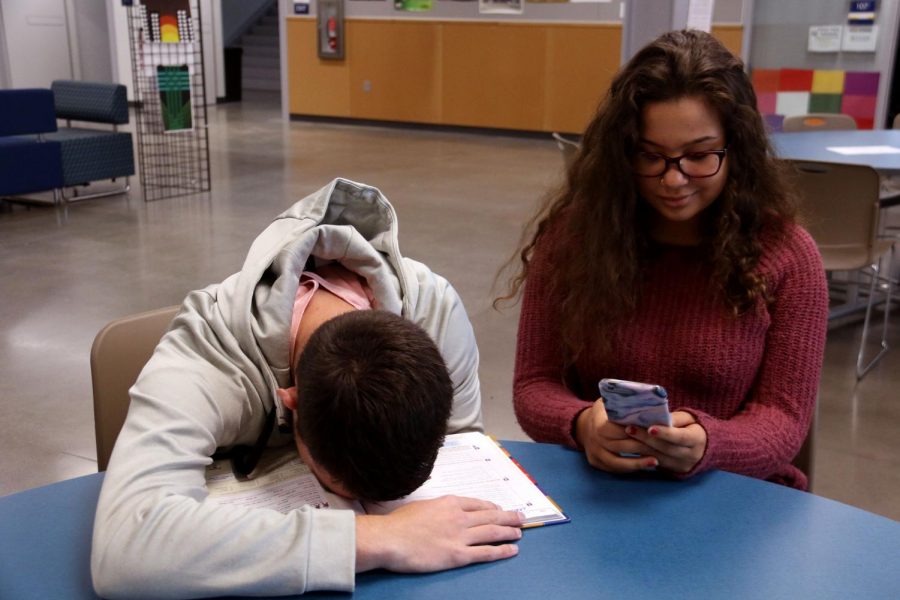A Growing Epidemic
May 30, 2018
Like a wave it hits, crushing and crippling all those who stand in its path. Uncontrollable procrastination, complete loss of motivation, neglection of school work and responsibilities, failure to remember important tests and due dates, increased classroom restlessness, it is–senioritis.
What is Senioritis?
Every year, as the days wear on, and the idea of summer begins to bounce around in all of our minds, it gets harder and harder to hold on. Senioritis is a disease that has been known to cripple high school students, specifically seniors hence the name, who are on their last and final stretch toward graduation, and Tahoma students are no exception.
“Usually they can keep it together until Spring Break,” said Gretchen Wulfing, a teacher at Tahoma High School who works solely with seniors, “but after that they tend to get really excited about moving on.”
Once Spring Break hits, and in the case of some students much earlier, it is often hard to see anything between then and graduation; “They have a harder time attending, it seems like they come to class less often, are less likely to turn in assignments, and have a really hard time staying on task,” said Wulfing.
According to a survey given targeting seniors at Tahoma, nearly 97% claim to have experienced the phenomenon of senioritis, 48% stating that they began to see symptoms after first semester, 23% when school first began and 29% at various points throughout or even before the year started. Among the most prevalent symptoms recorded in the survey, lack of motivation to do school work (92%), procrastination (93%) and having an unusually hard time getting out of bed in the morning (76%) rounded out the top three most common symptoms.

So Is It Real?
I think we’ve all heard someone pin their own laziness on the fact that they have a severe case of senioritis, (especially as an underclassmen) and thought “oh yeah, I’m sure that’s what it is,” but whether a person believes in senioritis or not, there is absolutely no doubt that the symptoms commonly associated with it do affect the majority of seniors.
What Is the Root of the Problem?
Okay, so let’s be real, as the weather warms and summertime gets closer, I think we have all experienced at least a few of the symptoms associated with senioritis despite our grade level. But why does it seem to hit seniors so hard that we have literally coined our own “disease?”
The answer lies within the future. “I think April and May can be kind of tough for some kids because they can see the light at the end of the tunnel but just aren’t quite there yet,” said Tahoma High School teacher Dan Strojan, who also teaches a majority of senior exclusive classes.
The majority of our entire lives have been working up to this one accomplishment, graduation. But it doesn’t stop here, it’s what waits for us all in the future that really distracts most high school seniors. For most students, we have waited our entire lives to get out on our own, so it is not much of a surprise that once we’ve figured out our future plans, it is hard to put our focus 100% anywhere else, especially in more school work.
I guess you could say that our minds are a little ahead of our bodies, daydreaming about the freedoms and new experiences life has to offer after high school, while in reality we still haven’t actually made it there yet.
Should We Be Worried?
Although it is true that senioritis can’t really kill you, many students may be surprised to hear that it can most definitely severely affect your immediate future. In extreme cases and although not incredibly common (but still possible,) a dramatic drop in your GPA, even if only in the last few months, can cause colleges to both rescind your acceptance and/or take away any merit based scholarships or financial aid you may have previously received.
So, next time you don’t feel like doing that assignment just remember that it could cost you in the long run–literally.
What Can You Do To Prevent It?
Granted there really is no “cure” for senioritis besides actually receiving your diploma, there are a few steps that students can take in order to best prevent and deal with the symptoms of senioritis. First and foremost, as hard as it may sound, the best way to deal with senioritis is to just to try your best to avoid it.
Scare tactics such as rescinding acceptances and taking away scholarships can help to motivate students not to let their grades drop, however this doesn’t do much in order to help the symptoms of senioritis that actually cause the drop in their grades. Although each student is different, it is always a good idea to set good study and work habits for yourself at the beginning of each year. By doing this, it will help you to be less likely to slack off later in the year when the temptations begin to arise.
Another precaution you can take in order to help fight the symptoms of senioritis is to simply set small goals for yourself. Senior year can be overwhelming, especially on the last stretch as classes begin to pile on final tests and projects. It’s important to stay focused and stay on top of your workload as much as possible by setting small and achievable goals for yourself each week.
Lastly and possibly most importantly, make sure to set some time aside for yourself. For many seniors, a majority of the problem lies in the fact that they feel so overwhelmed that they shut down and don’t end up getting anything done. It is important to always try your best to keep your schedule as equally balanced between responsibilities and relaxation as possible.
So as the year comes to a close, and for many of us the symptoms of senioritis begin to reach their peak, remember that we’re almost there.



